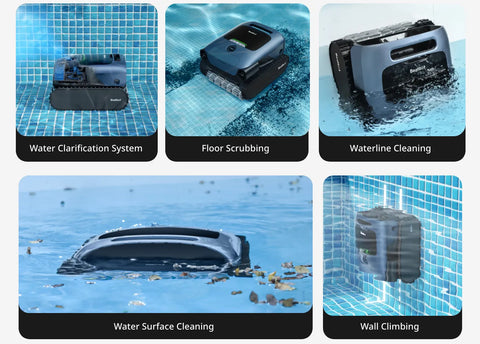Do Robotic Pool Cleaners Need a Booster Pump?
In the realm of pool maintenance, robotic pool cleaners have emerged as a game-changer, offering efficiency and convenience that were previously unimaginable. These autonomous devices navigate pools with ease, removing debris and dirt without human intervention. A common question among potential and current owners is whether these innovative machines require a booster pump to operate effectively. This article delves into the functionality of robotic pool cleaners, examining their design and operation to clarify the necessity, or lack thereof, of a booster pump.
Understanding the Functionality of Robotic Pool Cleaners
Robotic pool cleaners are designed to operate independently, with built-in motors that power suction and propulsion, allowing them to move across pool surfaces and vacuum up debris. Unlike traditional pressure-side or suction-side pool cleaners, which rely on external pumps, robotic cleaners have their integrated systems, negating the need for additional equipment. This section explores how these devices harness their technology to provide comprehensive pool cleaning.
The Independence of Robotic Pool Cleaners
One of the most significant advantages of robotic pool cleaners is their independence from the pool's main circulation system, eliminating the need for a booster pump. This independence is due to their integrated pump and filtration system, which operates separately from the pool's existing equipment. As a result, robotic cleaners do not impose additional strain on the pool's main pump and do not require the high water flow rates that pressure-side cleaners do, which necessitate a booster pump for optimal performance.
This self-contained design not only simplifies installation and operation but also enhances energy efficiency. Robotic cleaners draw electricity directly from a standard outlet and use it to power their internal motors and suction mechanism, independently circulating and filtering water within the cleaner itself. This process reduces overall energy consumption and can lead to significant cost savings over time, all while delivering exceptional cleaning performance without the complexity and expense of additional pool equipment.
Comparing Robotic Pool Cleaners With and Without Booster Pumps
When delving into the world of automated pool cleaning, it's crucial to understand the distinction between robotic pool cleaners that require booster pumps and those that do not. This comparison sheds light on their operational differences, helping pool owners make informed decisions based on their specific needs and pool configurations.
Robotic pool cleaners that necessitate booster pumps are typically pressure-side cleaners. These devices rely on high water pressure to move around the pool and suck up debris. The booster pump provides the additional water pressure needed for these cleaners to function effectively, enhancing their mobility and debris collection capabilities. However, this setup requires more complex installation, as it needs to be plumbed into the pool's return line, and it consumes more energy due to the additional pump operation, potentially leading to higher utility costs.
On the other hand, modern robotic pool cleaners that operate independently of a booster pump contain an integrated motor and filtration system within the unit. This design allows them to move and clean efficiently without relying on the pool's circulation system, providing several benefits. Firstly, these autonomous cleaners are typically easier to install and maintain, as they do not require integration with the pool's plumbing or an additional power source for a booster pump. Secondly, they tend to be more energy-efficient, as they directly convert electrical energy into cleaning action without the need for extra water pressure. Lastly, independent robotic cleaners often provide superior debris collection and filtration, capturing finer particles and reducing the burden on the pool's main filtration system.
Benefits of Choosing a Robotic Pool Cleaner
Robotic pool cleaners offer a myriad of advantages that cater to the needs of modern pool owners, emphasizing convenience, efficiency, and thoroughness. Firstly, their autonomous operation means they require minimal human intervention, allowing owners to choose from various cleaning modes to suit their needs. It ensures regular maintenance with significantly less effort compared to manual cleaning methods, translating to considerable time savings for the pool owners.
Energy efficiency is another key benefit, as robotic cleaners operate on lower power compared to traditional pool cleaning systems, which often require the pool's main pump and filtration system to be running concurrently. Moreover, robotic cleaners enhance water circulation and filtration within the pool, reducing the need for chemical usage and making the pool environment safer and more pleasant.

Robotic pool cleaners are also known for their thorough cleaning capabilities, equipped with advanced technologies to scrub, vacuum, and filter debris from all types of pool surfaces. They can reach tight corners, climb walls, and clean across various pool shapes and sizes, ensuring comprehensive coverage. Additionally, their built-in filtration systems capture fine particles, improving water clarity and hygiene.
Selecting the Right Robotic Pool Cleaner
When choosing a robotic pool cleaner, several factors should be considered to ensure you select a model that best suits your pool's specific requirements. Pool size is a critical factor; ensure the cleaner's cable length and battery life (if cordless) are sufficient to cover the entire area. For larger pools, look for models with extended coverage capabilities and efficient cleaning cycles.
The type of debris commonly found in your pool is another consideration. If your pool frequently accumulates large debris like leaves or acorns, you'll want a cleaner with a large, easily accessible debris canister. Conversely, if fine particles are more of an issue, look for models with fine filtration capabilities.
Additionally, consider the pool's surface material when selecting a robotic cleaner. Different models are specifically designed to be more effective on certain types of surfaces, equipped with unique brushes or wheels that optimize cleaning while preventing damage to the pool. The robotic cleaners provide selectable cleaning modes to accommodate various maintenance needs.
Moreover, some high-end robots grant users substantial benefits by providing access to detailed cleaning data and history via a companion app.
By evaluating these features, you can choose a robotic cleaner that delivers both convenience and adaptability, ensuring your pool receives a thorough and customized cleaning experience.
Conclusion
In conclusion, robotic pool cleaners stand out as a smart investment for modern pool maintenance, offering autonomous operation without the need for a booster pump. By leveraging advanced technology, these devices ensure thorough cleaning with minimal user effort, embodying the next step in the evolution of pool care. Understanding the independence and efficiency of robotic pool cleaners allows pool owners to enjoy a pristine pool environment, enhancing their leisure time and overall pool experience.
 US
US
 EU
EU



